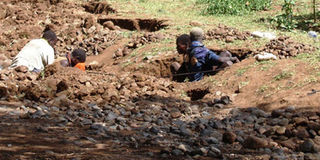Uganda told to guard against abuse of natural resources

Miners carry out small scale gold mining in Karamoja. FILE PHOTO
What you need to know:
Boost. New discoveries indicate Uganda’s mineral deposits have increased.
KAMPALA
Uganda will reap more benefits from its mineral sector if it implements the six tools of the regional initiative on natural resources, an official of the International Conference on the Great Lakes Region (ICGLR), has said.
The six tools include; regional certification mechanism, harmonisation of national legislation, regional database on mineral flows, formalisation of artisanal mining sector, promotion of the extractive industry transparency initiative and whistle blowing mechanism
Speaking on the sidelines of the International Mining Day celebrations in Kigali, Rwanda last week, Mr Vicent Muanda, the deputy executive secretary ICGLR, said it was important for Uganda to execute, especially the tools of the ICGLR regional certification mechanism and formalisation of artisanal mining.
“Certification eases the country’s minerals to be accepted by international buyers. Supporting artisanal mining encourages the miners to work for their benefit and the country’s,” Mr Muanda said.
The regional certification rights are interlinked with section 1502 of the Dodd – Frank Act, a US legislation which restrains companies from buying “conflict minerals” such as gold tin and tantalum from DR Congo and its nine adjoining neighbours (Tanzania, Zambia, Central African Republic, Angola, Uganda, Rwanda, South Sudan and Burundi) sold to benefit illegally armed groups.
It is reported that Ugandan exporters have been unable to export the aforementioned minerals because of the country’s delay to adopt the certification mechanism. Uganda mineral exports rake in over $100 million annually.
Recently Energy minister Irene Muloni announced that Uganda’s mineral deposits had increased with new discoveries.
She said a total of seven million ounces of gold worth about $11 billion had been discovered in Busia, Ibanda and Mubende. In addition, iron ore deposits are at 116 million tonnes with a net worth of about $16 billion.




